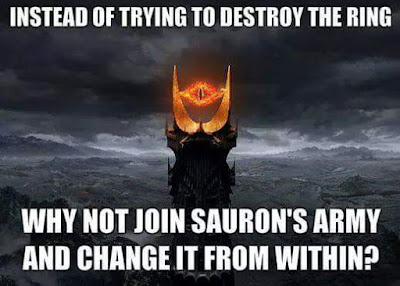Fathers and teachers, I ponder, "what is hell?" I maintain that it is the suffering of being unable to love. Once in infinite existence, immeasurable in time and space, a spiritual creature was given on his coming to earth the power of saying, "I am and I am love." Once, only once, there was given him a moment of active living love, and for that was earthly life given him, and with it times and seasons. And that happy creature rejected the priceless gift, prized it and loved it not, scorned it and remained callous. Such a one having left the earth, sees Abraham's bosom and talks with Abraham as we are told in the parable of the rich man and Lazarus, and beholds heaven and can go up to the Lord. But that is just his torment, to rise up to the Lord without ever having loved, to be brought close to those who have loved when he has despised their love. For he sees clearly and says to himself, "Now I have understanding, and though I now thirst to love, there will be nothing great, no sacrifice in my love, for my earthly life is over, and Abraham will not come even with a drop of living water (that is the gift of earthly active life) to cool the fiery thirst of spiritual love which burns in me now, though I despised it on earth: there is no more life for me and will be no more time! Even though I would gladly give my life for others, it can never be, for that life is passed which can be sacrificed for love, and now there is a gulf fixed between that life and this existence."
From 'The Russian Monk'; Book VI of the Brothers Karamazov by Fyodor Dostoevsky
A friend of mine recently told me of the deep sense of gratitude he experienced in relation to the actions of doctors and nurses who cared for his daughter when she had an illness. When he reflected on this he realised that it was possible to experience greater depths of thankfulness than he had previously imagined, or perhaps it was something in the nature of the gratitude he felt which seemed an almost numinous response to a gift he was powerless to give himself. After all the word gratitude stems from gratis, free.
In On Fairy Stories, Tolkien mentions that one of the purposes of fantasy is refreshment, to remake the world anew, so that it can offer itself back to you as the gift that it is, freed from the shackles of your own weariness of perception.
And thus fantasy, in essence myth, has a great moral element - it can enable us to see the world as gift and thus put us in right relation to the giver. And if we are also of the giver then we must be gift also, for others. A great sense of gratitude can pervade us when we really understand this, and also a great zeal to pour ourselves out for others, to be like the giver ourselves. If, like the rich man, we go through life not understanding this, how great a sadness that will be.



